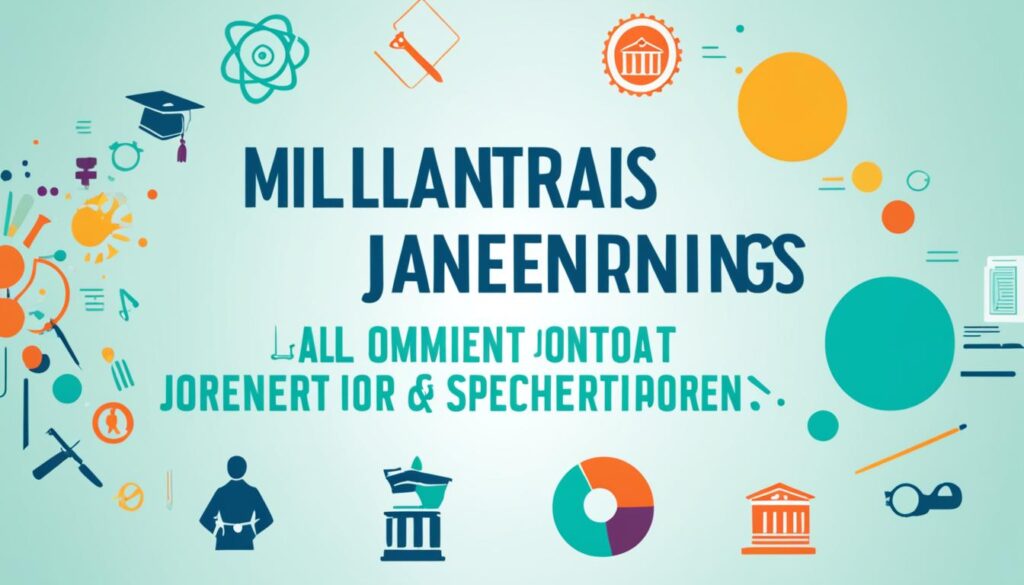Did you know that the average age of a graduate student today is 33 years old? Gone are the days when graduate school was primarily pursued immediately after completing a bachelor’s degree. Nowadays, individuals of all ages are choosing to pursue a master’s degree to advance their careers, upgrade their skills, and stay competitive in the job market.
According to the Council of Graduate Schools, the average age of graduate students has remained relatively static over the past few decades. However, there has been a noticeable increase in non-traditional students, including those who are older or have taken a break before pursuing their graduate education. This shift in demographics has led to a more diverse and inclusive graduate school experience.
Key Takeaways:
- The average age of a graduate student is 33, indicating a growing number of non-traditional students pursuing graduate education.
- Graduate programs are becoming more inclusive, accommodating the diverse needs and schedules of students of all ages.
- Pursuing a master’s degree is a valuable opportunity for personal and professional growth, regardless of age.
- Financial considerations, job opportunities, and income disparities should be carefully considered when deciding to pursue a graduate degree.
- The decision to pursue further education should be based on individual goals, interests, and commitment to lifelong learning.
Factors Affecting the Average Age of Graduate Students
When considering the average age of graduate students, it’s important to take into account various factors that can influence this measure. These factors play a significant role in shaping the demographics of graduate programs and contribute to the diversity of experiences among students.
One factor that affects the average age of graduate students is the duration of their undergraduate studies. According to Forbes Magazine, the majority of students take longer than the conventional four years to complete their bachelor’s degrees. This extended timeframe can delay their entry into graduate studies, resulting in a higher average age for graduate students.
Additionally, individuals may choose to take a break after completing their four-year bachelor’s program. Some may feel burned out from their undergraduate studies and decide to take some time off before pursuing a graduate degree. This break allows them to recharge, gain work experience, or explore other personal and professional opportunities.
Starting a family or gaining work experience are also factors that can influence the average age of graduate students. Many individuals prioritize family or career commitments before deciding to pursue advanced degrees. Once these responsibilities have been fulfilled or are more manageable, they may feel ready to dedicate the necessary time and resources to graduate studies.
However, the transition to a knowledge-based economy has transformed the graduate degree into a professional standard. This shift has led individuals to recognize the importance of upgrading their skills and remaining competitive in the job market. As a result, more people are choosing to go back to school, regardless of their age, in order to obtain a graduate degree.
Non-Traditional Educational Opportunities for Returning Grad Students
For non-traditional students and returning grad students, there are now more educational opportunities than ever before. Traditional brick-and-mortar schools are adapting to the needs of these students by introducing online and evening-class components. This allows individuals to pursue their graduate education while balancing work, family, and other responsibilities.
One option that provides the most flexibility for working adults is online graduate degree programs. These programs allow you to complete your coursework at your own pace and in the comfort of your own home. You can tailor your studies to fit your schedule, ensuring that you can prioritize your work and personal commitments while still advancing your education.
Furthermore, some schools recognize the unique needs of older learners and offer specialized programs designed specifically for individuals who are 55 and older. These programs take into account the life experience and career goals of returning grad students, providing a tailored educational experience that meets their specific needs.
Financial support is also available for non-traditional students pursuing graduate education. There are scholarships specifically targeted towards this group of students, providing financial assistance to help make their educational goals a reality. These scholarships can help alleviate the financial burden and make graduate education more accessible for returning students.
When considering your educational options as a non-traditional student or a returning grad student, it’s important to explore the various educational opportunities available to you. From online programs to specialized programs and scholarships, there are options that cater to your unique circumstances and goals. Take advantage of these opportunities to continue your education and achieve your career objectives.

The Age Range of Graduate Students
When it comes to pursuing a higher education degree, there is no age limit for adults. Regardless of your age, you have the opportunity to embark on a new educational journey and pursue a graduate degree. While the average age of a graduate student is 33, it’s important to remember that individuals of all ages can choose to further their education at any point in their lives.
Graduate school is not limited to a specific age group. It offers a platform for personal and professional growth, enabling you to expand your knowledge, develop new skills, and enhance your career prospects. What truly matters is your commitment to learning and your desire to make a positive impact in your field of study.
By entering graduate school, you join a diverse community of learners who are motivated to excel and make a difference. Whether you are in your 20s, 30s, 40s, or beyond, you can find inspiration and learn from individuals with diverse perspectives and life experiences.
As you navigate through your graduate education, seize every opportunity to engage with your professors, collaborate with your peers, and immerse yourself in the wealth of knowledge available to you. Remember, it’s never too late to pursue your dreams and invest in your intellectual growth.
Taking a Break Between Undergrad and Graduate Degrees
When it comes to pursuing a graduate degree, it is not uncommon for individuals to take a break between their undergraduate studies and graduate school. This break provides an opportunity to gain valuable work experience before diving back into academia.
By taking a break and gaining work experience, you can develop practical skills that will complement your academic pursuits. This real-world experience allows you to explore different career options, gain industry insight, and build a professional network that can enhance your graduate school experience.
Furthermore, taking a break between degrees provides the chance to reassess your academic and professional goals. It allows you to reflect on your undergraduate experience, identify areas of interest or passion, and determine the best path forward in terms of graduate studies. This self-reflection can lead to greater clarity and focus when you eventually return to graduate school.
It’s worth noting that some companies recognize the value of higher education and actively encourage their employees to pursue graduate degrees. In fact, they may even provide financial support or offer flexible work arrangements to accommodate your academic pursuits. This support from employers can make the transition from work to graduate school smoother and more manageable.

Overall, taking a break between your undergraduate and graduate degrees can be a strategic choice. It allows you to acquire work experience, gain clarity on your academic and professional goals, and potentially benefit from employer support. So, if you’re considering pursuing a graduate degree, don’t be hesitant to take a breath and gain some valuable real-world experience before embarking on the next phase of your educational journey.
The Age of Graduates in Different Fields and Programs
The age at which individuals obtain their graduate degrees can vary depending on the field of study and the specific graduate program. While some individuals may pursue a graduate degree immediately after completing their undergraduate studies, others may work for several years before deciding to further their education.
It is not uncommon for individuals to obtain their graduate degrees in their 30s, 40s, or even 50s. This variation in age is influenced by various factors such as career goals, personal circumstances, and the desire to gain practical experience before pursuing advanced education.
For example, professionals in fields such as business, healthcare, and technology often pursue graduate degrees later in their careers as they seek to enhance their skills and advance into leadership roles. On the other hand, individuals in academic fields like humanities and social sciences may choose to pursue graduate degrees immediately after completing their undergraduate studies.
Regardless of the age at which someone obtains their graduate degree, it should not be viewed as a determining factor of their success or ability to excel in their chosen field. Rather, the value of a graduate degree lies in the knowledge, expertise, and critical thinking skills acquired during the program, which are applicable to various stages of one’s career.
Example: Age of Graduates in Different Fields
- Business: The average age of graduates in business-related fields is around 30-35.
- Healthcare: Graduates in healthcare fields often obtain their degrees in their late 20s or early 30s.
- Engineering: Many individuals pursue graduate degrees in engineering in their late 20s or early 30s.
- Education: The average age of graduates in education programs is diverse, ranging from individuals in their 20s to those in their 50s or beyond.
Regardless of the field or program, graduate education offers individuals the opportunity to deepen their knowledge, specialize in a particular area, and advance in their careers.
Next, we will explore the financial considerations for graduate school, including funding options and scholarships.
Financial Considerations for Graduate School
Pursuing a graduate degree can be financially challenging. Unlike undergraduate education, where many students receive financial support from their parents, graduate students are often responsible for funding their own education. However, there are options available to help finance graduate school.
- Scholarships: Scholarships can provide significant financial assistance for graduate students. Many universities, organizations, and foundations offer scholarships specifically for graduate students. These scholarships are typically merit-based or need-based and can cover a portion or even the full cost of tuition and fees.
- Fellowships: Fellowships are another form of financial assistance available to graduate students. These awards are often highly competitive and provide funding for research, academic development, or professional training. Some fellowships also offer a stipend or living allowance to help cover living expenses.
- Assistantships: Assistantships are a common source of financial assistance for graduate students. These positions allow students to work for their university or department in exchange for a stipend and often include a tuition waiver. Graduate teaching assistantships, research assistantships, and administrative positions are common types of assistantships available to graduate students.
- Work and study: Many graduate students choose to work while pursuing their degree to fund their education. Working part-time or full-time allows students to earn money to cover tuition and living expenses. Some students may find employment opportunities on campus or in related fields that align with their academic and career goals.
It is important for individuals to research and explore all their options when considering the financial aspects of graduate school. Scholarships, fellowships, assistantships, and employment opportunities can help alleviate the financial burden and make graduate education more accessible.

Gender and Diversity in Graduate Programs
Graduate programs are experiencing a positive shift towards greater gender and ethnic diversity. According to Zippia, 35.8% of graduate students are women, while 64.2% are men, reflecting increasing gender inclusivity in higher education. When it comes to ethnic diversity, 61.7% of graduate students identify as White, followed by Hispanic or Latino (18.9%), Black or African American (9.5%), and Asian (4.9%). This growing diversity brings unique perspectives and experiences to graduate programs, promoting collaboration and fostering inclusive learning environments.
It is crucial for graduate programs to actively foster an inclusive environment that welcomes students from diverse backgrounds. By embracing gender and ethnic diversity, these programs enhance the overall educational experience through a broader range of perspectives and ideas. Collaborative learning and cultural exchange contribute to creating well-rounded graduates who are prepared to address the complexities of our global society.
Workforce and Job Opportunities for Masters
Masters graduates have a wide range of workforce opportunities available to them across various sectors. They are qualified to work in both private and public companies, with the majority (52%) finding employment in the private sector. The job market for master graduates is diverse, offering opportunities in industries such as professional services, education, manufacturing, healthcare, and technology.
To maximize their career prospects, it is essential for master graduates to stay updated on industry trends and job market demands. By keeping up with the latest developments and acquiring in-demand skills, they can enhance their competitiveness in the job market and increase their chances of securing fulfilling and well-paying positions.

Having a master’s degree opens doors to a wide range of job opportunities, giving graduates the flexibility to choose a career path that aligns with their interests and goals. Whether they aspire to become leaders in their field, pursue research-based roles, or contribute to societal development, a master’s degree provides them with a solid foundation to achieve their professional aspirations.
Key Workforce Opportunities for Master Graduates:
- Professional services: Master graduates can find employment in fields such as consulting, finance, accounting, legal services, and human resources.
- Education: Many master graduates pursue careers in teaching, curriculum development, and educational administration.
- Manufacturing: Industries such as engineering, technology, and supply chain management offer employment opportunities for master graduates.
- Healthcare: Master graduates in healthcare fields like nursing, healthcare management, and public health are in high demand.
- Technology: With the rapid advancement of technology, master graduates specializing in areas such as data science, artificial intelligence, and cybersecurity have promising career prospects.
Master graduates bring valuable skills and knowledge to the workforce, making them highly sought after by employers. Their advanced education equips them with critical thinking, problem-solving, and leadership abilities, enabling them to contribute effectively to the success and growth of organizations.
Age and Income Disparities among Masters
When considering the age and income of master graduates, it’s important to recognize that there can be significant disparities based on various factors such as education level and experience. The average age of masters is 40 years old, which suggests that many individuals pursue advanced degrees later in their careers to enhance their skills and opportunities.
According to Zippia, masters with an associate degree earn more than those without, with an average annual income of $80,707. This highlights the value of combining practical experience with academic qualifications. On the other hand, master graduates with a bachelor’s degree earn a median annual income of $76,614, showing that a higher level of education can still significantly impact earning potential.
For those with only a high school diploma or less, the average annual income is $70,189. This demonstrates that pursuing a master’s degree can create a substantial income gap compared to individuals with lower education levels.
When deciding to pursue a graduate degree, it is crucial to consider the potential return on investment. While income disparities exist among master graduates, higher education often leads to more significant salary prospects and increased opportunities for career advancement in the long run.
Conclusion
In conclusion, age diversity is a prominent aspect of graduate education today. While the average age of a graduate student is 33, individuals of all ages have the opportunity to pursue a graduate degree. Whether you’re a recent college graduate or someone with years of work experience, graduate programs cater to a diverse range of students.
Non-traditional students are increasingly returning to school to upgrade their skills and stay competitive in the job market. The rise of online and evening-class components in traditional brick-and-mortar schools provides more flexible educational opportunities for those with other commitments. Scholarships and financial assistance options also support non-traditional students in pursuing their graduate education.
Furthermore, graduate programs are actively fostering age, gender, and ethnic diversity, creating inclusive learning environments. It is important to consider financial considerations, job opportunities, and income disparities when deciding to pursue a graduate degree. Ultimately, your decision should align with your individual goals, interests, and commitment to lifelong learning.
FAQ
Q: How old is the average Masters?
A: The average age of masters is 40 years old.
Q: What factors affect the average age of graduate students?
A: Many factors can influence the average age of graduate students, such as taking a break after completing a bachelor’s program, starting a family, or gaining work experience.
Q: What are the non-traditional educational opportunities for returning grad students?
A: Non-traditional students have access to online and evening-class components, as well as specialized programs for learners age 55 and older.
Q: What is the age range of graduate students?
A: The age range of graduate students varies, but the average age is 33 years old.
Q: Is it common to take a break between undergrad and graduate degrees?
A: Yes, many individuals choose to gain work experience before pursuing a graduate degree.
Q: At what age do graduates obtain their degrees?
A: The age at which individuals obtain their graduate degrees can vary, but it is not uncommon to obtain a degree in the 30s, 40s, or even 50s.
Q: How can graduate school be financed?
A: Graduate school can be financed through fellowships, scholarships, assistantships, or by working and taking classes part-time.
Q: How diverse are graduate programs in terms of gender and ethnicity?
A: Graduate programs are becoming more diverse, with 35.8% of students being women and a range of ethnicities represented.
Q: What are the job opportunities for masters graduates?
A: Masters graduates have diverse employment opportunities in various sectors, including professional services, education, manufacturing, healthcare, and technology.
Q: How does age affect the income of masters graduates?
A: The income of masters graduates can vary based on factors such as education level and experience, but the average annual income ranges from ,189 to ,707.
Q: Does the average age of a graduate student matter?
A: No, individuals of all ages can choose to pursue a graduate degree. The important factor is the individual’s commitment to learning and their desire to enhance their knowledge and skills.
Source Links
- https://www.gradschoolhub.com/faqs/what-is-the-average-age-of-a-graduate-student/
- https://talk.collegeconfidential.com/t/is-it-normal-to-be-older-than-24-when-you-get-a-masters-degree/1909456
- https://www.zippia.com/master-jobs/demographics/


